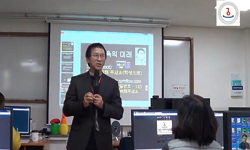This study aims to investigate the phenomenon of faculty turnover in local universities and to explore the experiences and meanings associated with faculty transitions before and after such turnovers. To achieve this, in-depth interviews were conducte...
http://chineseinput.net/에서 pinyin(병음)방식으로 중국어를 변환할 수 있습니다.
변환된 중국어를 복사하여 사용하시면 됩니다.
- 中文 을 입력하시려면 zhongwen을 입력하시고 space를누르시면됩니다.
- 北京 을 입력하시려면 beijing을 입력하시고 space를 누르시면 됩니다.
https://www.riss.kr/link?id=A109531392
- 저자
- 발행기관
- 학술지명
- 권호사항
-
발행연도
2025
-
작성언어
-
-
주제어
지방대학 ; 대학 교수 ; 이직 경험 ; 이직 의미 ; local universities ; faculty ; turnover experience ; meaning of turnover
-
KDC
370
-
등재정보
KCI등재
-
자료형태
학술저널
- 발행기관 URL
-
수록면
363-387(25쪽)
- 제공처
-
0
상세조회 -
0
다운로드
부가정보
다국어 초록 (Multilingual Abstract)
This study aims to investigate the phenomenon of faculty turnover in local universities and to explore the experiences and meanings associated with faculty transitions before and after such turnovers. To achieve this, in-depth interviews were conducted with five faculty members who had worked at local universities and transitioned to other institutions within the past five years. Using an inductive analysis approach, the study identified key themes related to their experiences and the meanings ascribed to these transitions. The analysis revealed that, prior to turnover, faculty members faced challenges such as a wavering sense of professional identity, strained relationships with colleagues, and organizational as well as personal instabilities. Following their transitions, they reported feelings of anxiety about new beginnings, aspirations for a more stable life, and a renewed sense of purpose as educators and researchers. Faculty turnover was perceived as a process of survival and a means to rediscover personal, academic, and educational identities while seeking improved professional environments. The findings underscore that the ability of university faculty to secure their identity and stability plays a critical role in their professional satisfaction, reflecting an essential aspect of survival rather than merely a pursuit of better conditions. Based on these insights, the study provides academic and practical implications, emphasizing the need to expand research on faculty identity in light of the evolving roles of university faculty. Additionally, the findings highlight the importance of improving organizational culture within universities to enhance overall faculty satisfaction and adaptability.
동일학술지(권/호) 다른 논문
-
대학 전공교육과정 질 관리를 위한 평가도구 개발 연구 - H 대학 사례를 중심으로
- 한국열린교육학회
- 서일보(Ilbo Seo)
- 2025
- KCI등재
-
한 지방 소규모 사립대의 과정 중심 평가 전면 시행 첫 학기의 성과와 한계
- 한국열린교육학회
- 임수진(Soojin Lim)
- 2025
- KCI등재
-
저소득층 청소년의 자기주도학습 역량 유형에 따른 잠재집단 분류와 심리적 특성 및 사회적 관계, 진로개척 역량과의 관련성 탐색
- 한국열린교육학회
- 최은영(Eunyoung Choi)
- 2025
- KCI등재
-
문민정부 개혁정책을 통한 한국 민주주의 공고화: 사례분석과 평가
- 한국열린교육학회
- 유경하(Kyungha Yu)
- 2025
- KCI등재





 KCI
KCI 스콜라
스콜라






